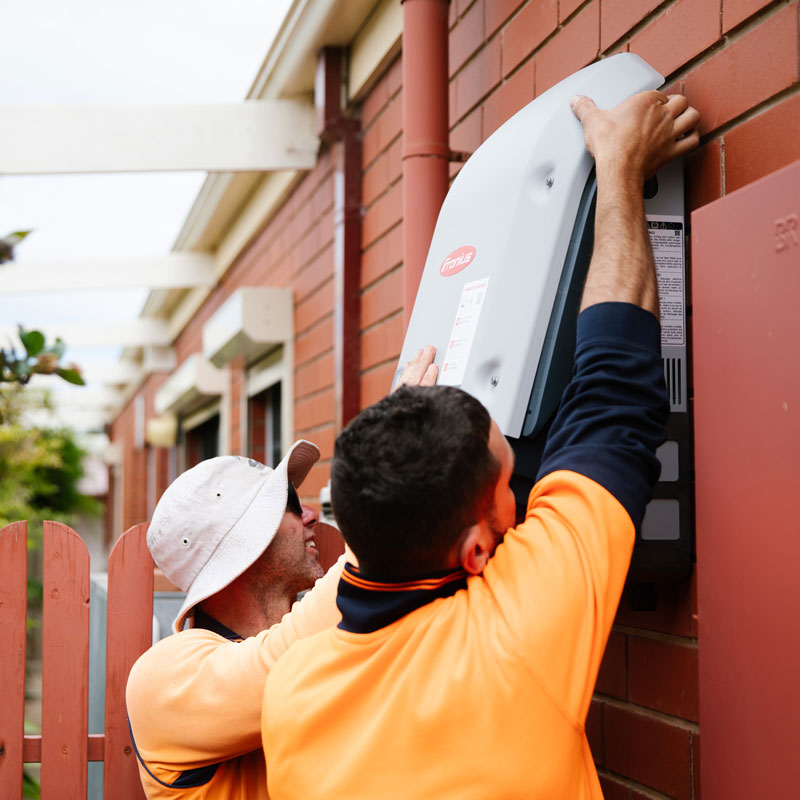Important information
for installers and retailers
The updated inverter product standard, AS/NZS 4777.2:2020 Amd 2:2024, came into effect on 23 August 2025.
Non-compliant inverter models have been removed from the approved products list. Check the approved product list to ensure your inverter models are still eligible for small-scale technology certificates (STCs).
Approved inverters list
Search the Clean Energy Council's list of approved inverters.
This list contains over 1,800 inverter and Power Conversion Equipment (PCE) models that have been approved to meet relevant Australian and international standards, as well as other checks to make sure inverters are safe for Australian consumers. State electricity networks and government rebate programs, including the Small-scale Renewable Energy Scheme (SRES), require that solar systems use PV modules from this list.
Additional Listing Notes
Model numbers with a (AS4777-2 2020) suffix are approved with a AS/NZS 4777.2:2020 Certificate issued by a JAS-ANZ accredited Certifier or State Electrical Regulator.
Updates to licensee/certificate holder names and model numbers for select approved products
We have made changes to model numbers or licensee/certificate holder names for a small number of approved products.
Please refer to the corresponding date of change and explanatory notes for each model on the list and ensure you use the correct details for STC claims.
Inverters with Software Communication Clients
Inverters with software communication client (SCC) details included in their listing are considered to have a communication channel that is compliant to IEEE 2030.5 CSIP-AUS, either hosted locally on the inverter or a gateway device, or via a certified cloud connection to the network operator utility server.
The software communication client information shown on the Approved Inverter List is based on testing conducted by SA Power Networks.
UPDATE: Changes to the CSIP-AUS testing and certification process are expected in Q4 2025 (relating to the first step described below). Manufacturers seeking CSIP-AUS certification in the future should refer to https://www.csipaus.org/ for more information.
To have software communication client information included in an inverter listing, please follow the steps below:
- First, follow the instructions on the SA Power Networks webpage to have the appropriate witness testing completed.
- This testing should cover all models for which software client details will be shown on the Approved Inverter List.
- Please note that only models specified within the witness testing report generated by SA Power Networks will be able to be updated by the Clean Energy Council.
- Once a witness testing report has been generated, this will be provided directly to the Clean Energy Council by SA Power Networks.
- Once the Clean Energy Council has received the witness test report from SA Power Networks, the models included in the report are reviewed against current inverter listings and inverter listing applications under assessment.
- If the inverters that have been tested are already included on the approved inverter list, then an application to update the listing is generated. Please note an application update fee of $1,000 (plus GST where applicable) will apply.
- If the update application pertains to inverter models that are currently under assessment to be included on the general approved inverter list, then no additional charge is applied, and the Software Communication Client details will be included on the inverter listing from its approval date.
- Applicants must notify the Clean Energy Council if a listing application is submitted for models that have had SA Power Networks witness testing completed.
- Each application is for a single inverter OEM and software client OEM, with no cap on the number of models that can be included per application, provided all relevant test reports are provided on the same day.
- Note that if test reports are provided on different days, then they will be processed separately, and a new fee will be applied to each updated application.
Product de-listings, suspensions and recalls and faults
Find details of products that have been recently removed from our products lists or recalled by the Australian Competition and Consumer Commission (ACCC) and understand how to report a fault.
Our product lists are dynamic and products can be suspended or de-listed at any given time if found in breach of the Clean Energy Council's product listing terms and conditions. View recent de-listings and suspensions below.
You can also view Product Recalls, issued by the ACCC. If a product is recalled by the regulator, it may be removed from our product lists if it also constitutes a breach of the product listing terms and conditions.
If you spot a fault with a Clean Energy Council approved product or believe it breaches our terms and conditions, report it here.
Apply to have your inverter or PCE included in our product listing
To have your inverter or PCE included on the Clean Energy Council approved products list, ensure that your products meet the requirements outlined above, then begin your application.

